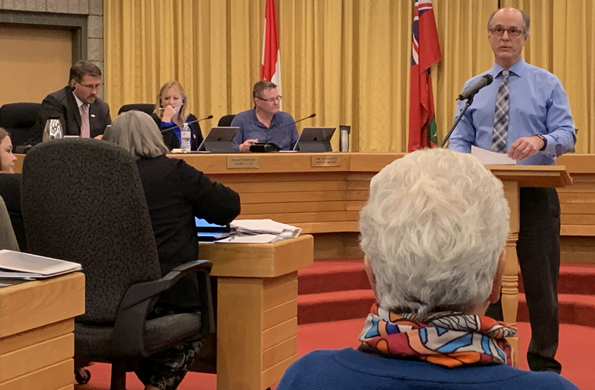Adam Bramburger
Beaver Staff
Loyalist Township is moving toward adoption of a 2019 operating budget that is poised to raise taxes for the residential class by an average of three per cent.
A report by the township’s director of finance Stephen Dickey brought forward to a public meeting during Monday’s council session suggests that the owner of the average property, valued at $253,250, will pay $36 more this year than last to meet a general tax levy requirement of $15,161,100. The levy is up $730,400, which is a 5.1-per-cent increase from last year.
With actual growth and a boost of assessment revenue due to the Municipal Property Assessment Corporation’s four-year phase in of market value assessment, the Township has managed to not increase its tax rate this year.
Offering a high-level overview, Dickey attempted to show residents where their tax dollars are spent. Of the $1,813 that average taxpayer pays $765 annually goes to salaries,wages and benefits — 42 per cent of the overall budget. Another 16 per cent goes to materials and supplies and that taxpayer pays $193.04 for policing annually. By department, about a third of each tax dollar goes to infrastructure services.
Pressure from external agencies added $82,200 to the budget this year with the Cataraqui Region Conservation Authority levy alone increasing by 9.5 per cent.
Dickey noted Loyalist intends to spend nearly $6.3 million on capital projects this year. Nearly $4.5 million is in infrastructure with road projects, storm sewers, and the County Rd. 6 roads garage expansion budgeted. Other capital expenses deal with information technology upgrades, a new pumper truck for the fire department, and some parks projects.
Nearly $1.8 million will come from this year’s operating budget to pay for the capital projects. Grant funding will contribute close to $3 million. The balance will come from development charges, reserves, and debt.
Dickey also addressed utilities budgets, which are funded by rates. For water, costs remain fairly consistent while revenues will go up due to development and rate changes. The flat rate is projected to go from $31.52 to $34.04 and the consumption rate from $1.58 to $1.71. Close to $1.35 million will go to capital projects, including upgrades to the Bath water plant and water mains.
For sewer, revenues are up with 98 new connections, but Dickey said cost pressures remain due to capital needs and maintenance. Some $667,000 will be spent on capital with about half going to replace equipment at the Bath sewage plant.
Council spent committee of the whole meetings deliberating the budget numbers. It received no feedback at the public meeting. Approval could come April 8.
There are a few considerations left that could impact the budget. Dickey noted that an expected provincial granting program was cancelled, leaving a $560,000 shortfall and Ontario Municipal Partnership Fund contributions dropped by about $50,000. That said, the Province offered a one-time grant of $536,761 for modernization and efficiency (which isn’t directed to any particular project) that could offset those losses. Also, the federal government announced in its budget a one-time doubling of gas tax funding, offering $500,000 toward infrastructure work.
Mayor Ric Bresee thanked staff for working to get a draft with no rate increase before council.
“There was a lot of hard work coming into this budget preparation with a lot of hacking and slashing and a lot of to and fro-ing and, unfortunately, change handed to us from external sources… but we have come to a budget that hopefully will guide us for the coming year.

